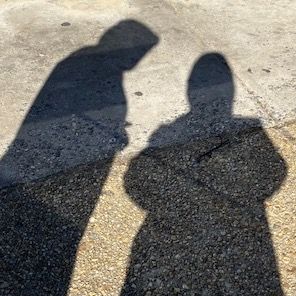Attention
Recognizing Misinformation and Disinformation
A Personal Perspective: Shadows can be beacons of truth.
Posted February 6, 2023 Reviewed by Michelle Quirk
Key points
- The shadow that follows us in life is not our silhouette cast on sidewalks but, rather, the reflection of what we say and do.
- Misinformation and disinformation casts shadows of doubt.
- Scammers are having a heyday because we want to believe what we hear and read.

We were walking home from the park on a sunny day several years ago with our then–4-year-old grandson when he discovered his shadow.
He was just learning how to ride a bike and was proudly peddling along when he spied the distinct outline of his bicycle traveling next to him on the sidewalk.
He was surprised and stopped to ask us what it was.
It’s your shadow, we told him.
My shadow?
We pointed to the sun just to the right of his shoulder and told him that the light from the sun had created a shadow from his bike and that this shadow would follow us home. We also showed him our shadows, at which point, he got off his bike, waved his arms, and giggled with delight in discovering his shadow and what it could do.
His next question, of course, was pure 4-year-old genius:
Does everything and everyone have a shadow?
The very first poem I ever memorized was Robert Louis Stevenson’s, "My Shadow." I think I was in second or third grade at the time, and of all the poems I had to memorize in school, this one has stayed with me.
When I first memorized it, the opening lines of the first stanza felt rather sweet and innocent, even a little naïve, but now it seems quite prescient:
I have a little shadow that goes in and out with me,
And what can be the use of him is more than I can see.
The sun casts our shadows on the sidewalk, and, just as well, our deeds cast shadows as we move through our lives.
We all have shadows that follow us around. What is the use of them?
The shadow that follows us in life is not our silhouette cast on sidewalks but, rather, the reflection of what we say and do. It is the impression of our words and deeds, and it lasts far beyond any shadow cast on a sunny day.
When what we say doesn’t match how we live, we are quickly labeled a hypocrite. In short, everything we do and say casts an impression, or a shadow if you will, of our deeds.
Likewise, when someone tells us something that doesn’t quite feel right, it casts a kind of shadow on our thinking about what that person is saying.
This kind of “shadow” acts like a lie detector test, but, often, because we want to trust the person speaking or we want to believe what they are saying despite our discomfort that it might not be true, we ignore that shadow.
We need to pay attention to the shadows.
We are living in a murky time of half-truths, misrepresentations, scams, exaggerations, and downright lies, as well as disinformation and misinformation. For the record, misinformation is false or inaccurate information that often comes from ignorance, while disinformation is deliberate and includes malicious content such as hoaxes, phishing, and propaganda. Disinformation is more damaging because it spreads fear and suspicion through its falsehoods.
Unfortunately, there are things we want to believe that might not be the truth, and truth that flies in the face of what we would like to otherwise believe to be true, so we count it as false.
There is so much information at hand through the Internet, television, newspapers, social media, artificial intelligence, and the constant spam calls on our phones, it's easier to pick and choose what we would like to believe rather than to take the time to question information that might conflict with our beliefs.
Take a deep breath. Take all the time you need.
If you have questions or doubts about what you are hearing in the news or what someone is trying to sell you, or you just feel a bit queasy when someone says something that doesn’t feel like it rings true…it probably isn’t true.
Also, if it’s too good to be true, it probably isn’t true…like that magic pill that will melt the pounds away while you’re eating ice cream.
We are easy prey these days to the bombardment of misinformation and disinformation coming our way. Scammers abound because they are wildly successful: kind of like a virus. They realize that we are wired to open emails out of curiosity or because the message feels important and warrants our attention. Gotcha!
Pay attention. Think before you click. Step back from those emails, that “news” story, and those promises of wealth and health you get in the mail. Do a little research about what someone is selling or saying before you decide to agree or disagree with what you are being offered or are hearing.
Shadows can be both mysterious and enlightening.
Once our grandson understood where the shadow image of his bicycle came from, he embraced it and knew it to be true.
Pay attention to the shadows.
Take the time you need to explore and ask questions so you can get to the truth…
Beyond a shadow of a doubt.




